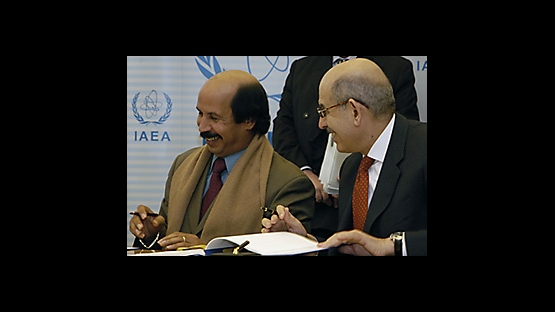Libya today signed an Additional Protocol to its Nuclear Non-Proliferation Treaty (NPT) safeguards agreement, giving IAEA inspectors greater authority in verifying the country's nuclear programme. Mr. Matooq Mohamed Matooq, Assistant Secretary for Services Affairs of the General People's Committee of the Socialist People's Libyan Arab Jamahiriya, and IAEA Director General Mohamed ElBaradei signed the Protocol that requires Libya to provide expanded declaration of its nuclear activities. The Protocol grants IAEA inspectors broader rights of access to sites in the country allowing them to provide assurance about both declared and possible undeclared activities. Libya has stated its intention to act as if the protocol is already in place, pending its formal entry into force.
Also on 10 March, the IAEA Board adopted a resolution on the Agency's continuing verification of Libya's nuclear programme.
Late last year, Libya announced its decision to eliminate all materials, equipment and programmes leading to the production of internationally proscribed weapons - including nuclear weapons. Since then the IAEA has been working closely with the Libyan authorities to gain a complete picture of Libya’s nuclear programme and history.
Dr. ElBaradei said signing the Protocol was an indication of Libya's commitment to move away from weapons of mass destruction. "It will allow the Agency to verify that nuclear activities in Libya are used only for peaceful purposes." Libya would continue to reap the full benefits of nuclear applications for peaceful uses such as energy, agriculture and medicine, he said.
In his March report to the IAEA Board, Dr. ElBaradei stated "following the disclosure of its undeclared nuclear activities, Libya has granted the Agency unrestricted access to all requested locations, responded promptly to the Agency’s requests for information, and assisted the Agency in gaining a full picture of its nuclear programme... This active cooperation and openness is welcome, and will facilitate the Agency's ability to complete its verification of Libya's past nuclear activities. As in the case of Iran, the Agency also requires the full cooperation of the countries from which the nuclear technology and material originated."
To date Additional Protocols are in force in only 54 States. "I reiterate my call on all States that have not done so to conclude and bring into force their respective safeguards agreements and additional protocols," Dr. ElBaradei said.


